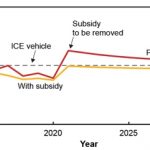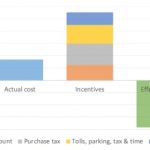Norway is an EV leader thanks to a generous pot of tax incentives. Today, battery-electric cars make up more than half of all new car sales in Norway. Schalk Cloete takes a detailed look at what those incentives cost, and how many tonnes of CO2 they avoid. In short, Norway – a major oil and gas exporter - needs to sell over 100 barrels of oil (which emits 40 tonnes of CO2) to pay for the tax breaks it gives EVs to avoid one tonne of CO2. And … [Read more...]
China’s car sales target: 40% EVs by 2030 will cost CNY 100bn/year (€13bn, $15bn)
By the end of the 2020s China will phase out EV subsidies and instead rely on a mandate imposed on manufacturers to target 40% of car sales being electric by 2030. Nancy Stauffer at MIT reviews a study that estimates the new rules will result in 66m EVs sold in China in the next 10 years. That will move EVs well into the mainstream and have global consequences. According to the study, the total cost of that transition will be 100bn yuan/year … [Read more...]
E-mobility in Germany: a record year but still way off target
In the past few months Germany has seen record levels for electric car registrations. But will this rising trend be enough to meet the government’s target of 10 million electric cars by 2030? To answer the question Naemi Schink and Simon Göss at Energy Brainpool look at the data, proposed new regulations, and funding. Though the number of electric cars has grown by over 360% in the last year there are currently only 240,000 EVs and 200,000 … [Read more...]
Only giving tax breaks to zero-emission company cars will accelerate e-mobility
Subsidies and tax breaks for company cars in Europe cost €32bn a year, a hangover from the days when governments were happy to encourage driving. Chris Bowers at T&E reviews a study that explores the issue in a wide range of European nations and reveals that 96% of company cars are petrol and diesel. As an indicator of the scale of emissions, the study says Europe’s 10 largest leasing companies alone – which include BMW’s Alphabet and … [Read more...]
Tesla’s BEVs vs. Toyota’s hybrids: the battle for the future of low emission cars
Which car firm will dominate the future? Tesla and its BEVs or Toyota with its hybrids? Schalk Cloete looks at the cost reductions coming down the line. He says that the hybrids have many more improvements on the way, whereas in terms of performance and efficiency the BEVs are already reaching their peak. Though further and considerable progress in battery technology is coming, it will benefit both. For city driving both will rely on battery … [Read more...]
How much subsidy do EVs need to be competitive?
Despite a wide range of subsidies and incentives, battery electric vehicles (BEV) make up only 1.4% of new car sales in the U.S. That the effective battery cost is zero to the consumer doesn’t seem to be lifting that number any higher. Meanwhile, in Norway the percentage is a much more impressive 42%, but those subsidies and incentives are far higher: the effective battery cost is negative 385 $/kWh for a typical 60kWh battery pack, i.e. a very … [Read more...]
Accelerating electromobility in east Europe: a how-to guide (part 1)
While record electric vehicle (EV) sales in high income countries keep making headlines they’re struggling to take off anywhere else. Sarah Keay-Bright plots a pathway for change. Like anywhere else, public investment must come first, carefully paving the way for private to follow. So that means getting the tax regime right. As taxes rise to disincentivise fossil cars those revenues will fall as people go electric. So they need to be replaced. … [Read more...]








